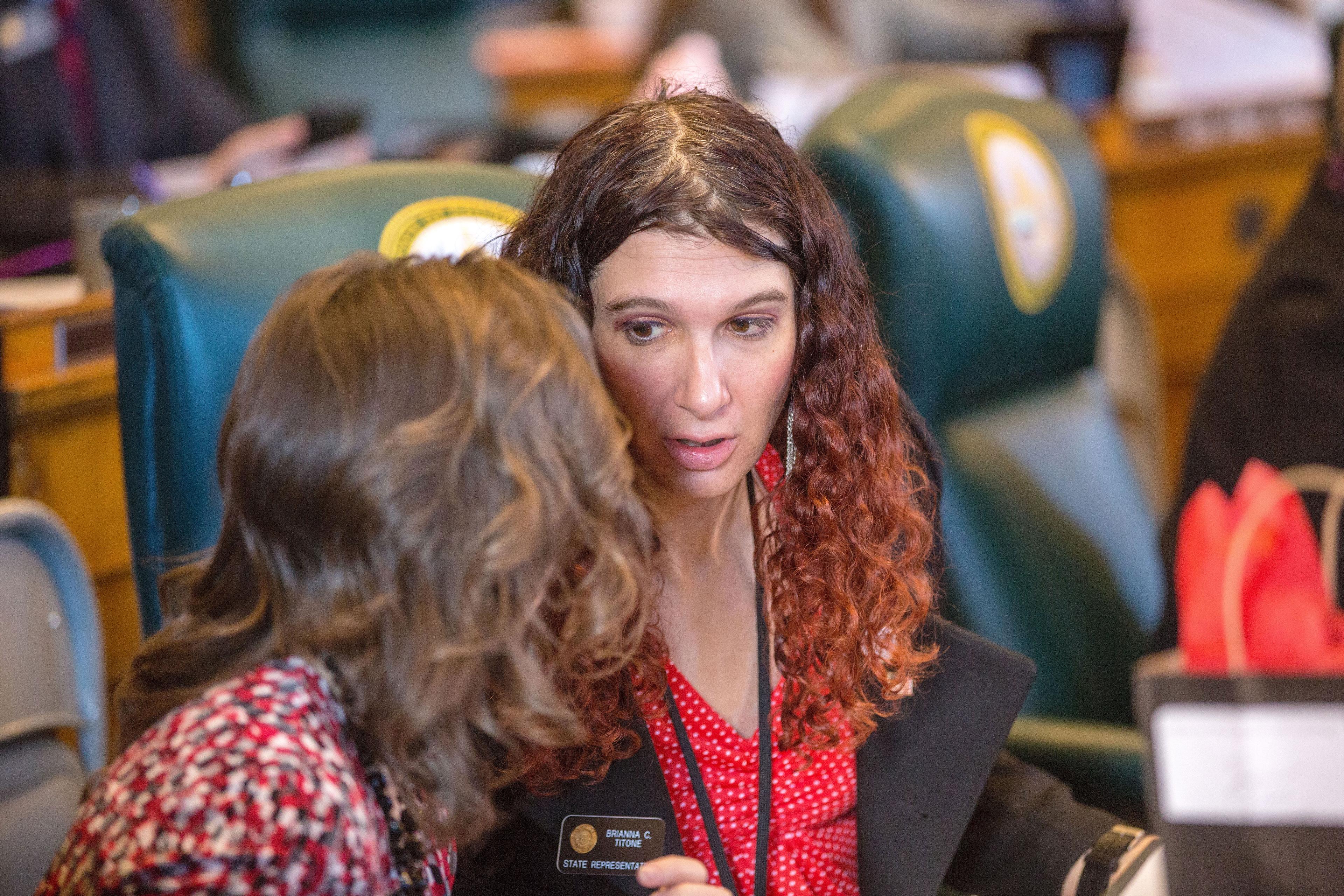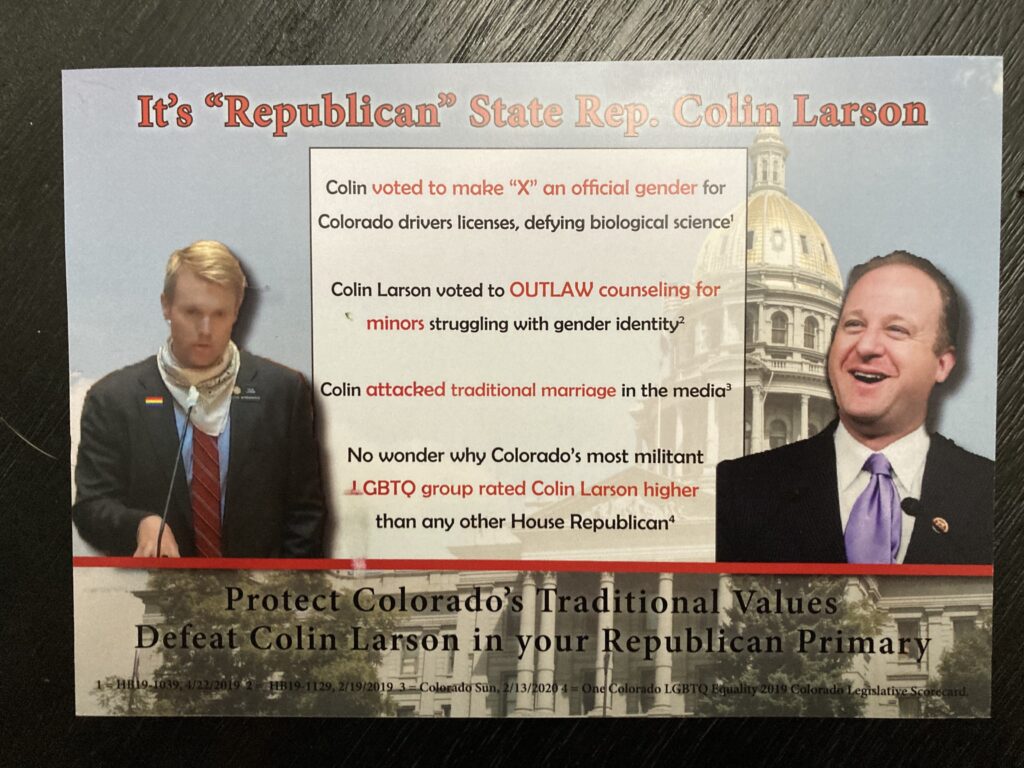
Multiple conservative independent expenditure groups are using anti-LGBTQ messaging to try to unseat one of the state House’s most vulnerable Democratic lawmakers, state Rep. Brianna Titone.
Titone, Colorado’s first openly transgender lawmaker, narrowly flipped a Republican held-seat in Arvada in the 2018 blue wave, winning by 439 votes. Her victory took both Democrats and Republicans by surprise.
Now as she stands for reelection, some voters in the Arvada-based House District 27 have received robocalls that warn, “Representative Titone is as a transsexual state representative who wants to force a radical sexual agenda on every Coloradan.” Others have seen Facebook ads and campaign flyers that refer to her by her birth name, an anti-trans practice known as ‘dead naming.’
“In 2018 nobody expected me to win so I wasn’t a threat to them. That’s why there were no attacks,” Titone said.
Republicans view her seat as one of their few pick up possibilities in an election year that is expected to favor Democrats in Colorado.
“It’s really in bad taste what he’s doing,” Titone said in reference to her colleague Republican state Rep. Stephen Humphrey of Ault, who voiced the robocall, paid for by his independent expenditure committee, Colorado Family Values Victory Fund.
In the message, Humphrey says, “Titone supports policies that force your wives and daughters to share bathrooms with biological men who identify as female.” He adds that Titone is just “too dangerous” for Colorado families.
Humphrey is term-limited and will not be returning to the state legislature next year. He did not return CPR’s request for comment. Colorado Family Values also spent roughly $4,600 on an anti-Titone mailer being sent to voters.
Election mail from a separate group, Coloradan for Safer Neighborhoods which is affiliated with Rocky Mountain Gun Owners, uses her birth name in its ad.
A third group, Take Back Colorado, has purchased Facebook ads that also misgender Titone and use her dead name. The ads accuse her of “attacking law enforcement and sexualizing children” without providing any context. The group’s registered agent, Joe Neville, who is the brother of the current House Minority Leader Patrick Neville, did not respond to a request for comment.
Titone’s GOP opponent, Vicki Pyne, hasn’t made Titone’s gender identity an issue in the race. She hasn’t spoken out against the attacks and did not return CPR’s request for comment.
Titone said two Republican House members did reach out to her privately to tell her they disagreed with attacks on her gender identity. She says since the transphobic ads launched, she’s been the target of even more hate speech and trolling online.
“I'll never get used to it, but I'm learning to live with it as it's never going away. Tiny arrows hurt when there are so many,” Titone said.
She said she deliberately chose not to be the lead sponsor on the biggest LGBTQ rights bills of the past two years to ensure she wasn’t defined by that issue.
Republican political consultant Tyler Sandberg said while robocalls are an incredibly cheap way to reach voters —- only about 3 cents per call if someone picks up — they're also generally ineffective because many people don’t have landlines, and those that do often don’t answer a call from a number they don’t recognize, let alone listen to the entire message.
“It’s shouting into a void with a message that no-one’s responding to,” said Sandberg, adding that the issue of gay rights is settled in Colorado.
32-year-old unaffiliated voter Chase Meyer from Arvada did pick up the phone and listen. He describes himself as middle-of-the-road, and said he voted for both Republicans and Democrats this year. He said he spent a lot of time thinking about the House race and had already cast his vote the night before he received the robocall.
“It irritated me so much that it would even be an issue,” said Meyer of Titone’s gender identity. “In recent years everything has gotten more radicalized. When I’m looking at politics, I’m not looking at whether someone is gay or straight.”
Meyer voted for Titone and said these types of tactics make it harder for him to identify with Republicans.
Other LGBTQ attacks used in Republican primary
This isn’t the first time this year that Humphrey’s group has used anti-LGTBQ attack ads against a candidate in Colorado.
This spring, his independent group tried to use Republican state Rep. Colin Larson’s record on gay rights against him during a bruising primary with a more conservative opponent. Larson represents a district in southern Jefferson County.
Larson voted in favor of banning gay conversion therapy for minors and to allow transgender people to obtain new birth certificates. His opponent attacked him as anti-“traditional marriage.”
A campaign mailer from Colorado Family Values Victory Fund tried to insinuate that Larson, who is married to a woman, is gay. A photoshopped image of Larson added a rainbow flag pin to his lapel and a pearl earring to one ear. It also altered his hair to a bleached blond color.

“The 1980s called and they want their stereotypes back,” Sandberg said.
The mailer also included a picture of Gov. Jared Polis, the country’s first openly gay man elected governor.
“It was a childish attack and frankly laughable,” said Larson of the flyer and the photoshopped image. “If anything it probably got me more votes because people didn’t take it seriously.”
He also called it blatantly homophobic.
Larson won the primary by 12 percentage points.
Colorado’s leading LGBTQ advocacy group said it’s disappointing but not surprising that there are still some in politics who think it’s OK to attack candidates based on their gender identity and sexual orientation.
“I think it speaks to a point of desperation from this arguably smaller and smaller constituency of the Republican party,” said Michael Crews, policy director for One Colorado. “It should be focused on the issues. It’s not about how somebody identifies.”









